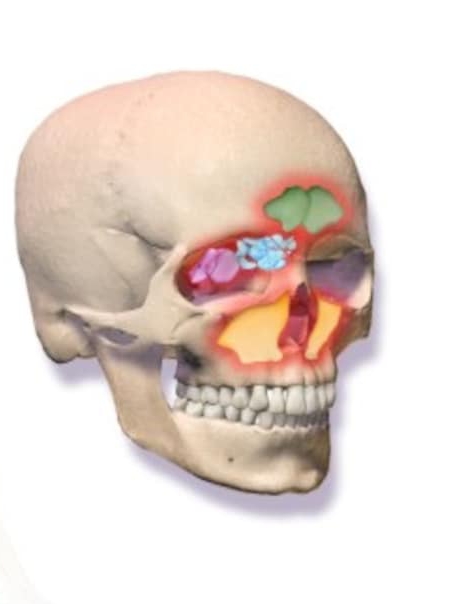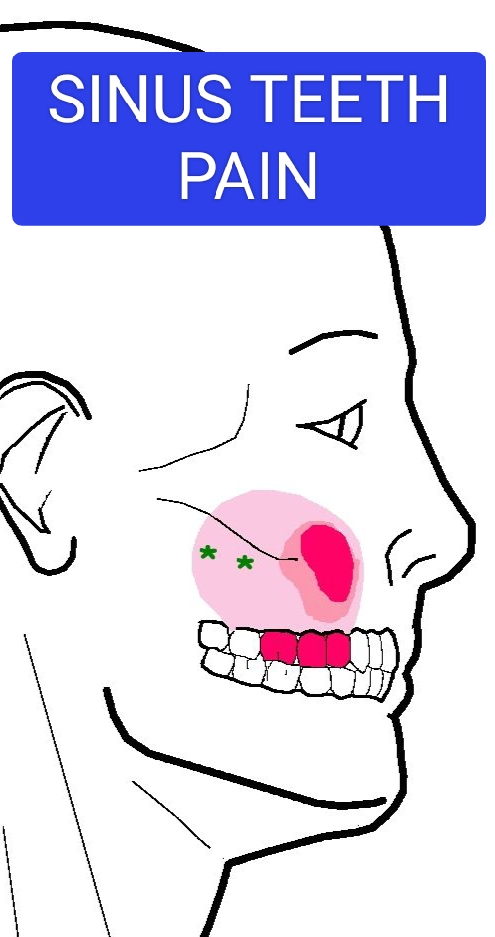Sinusitis is an inflammatory condition that affects the sinuses, the cavities around the nasal passages. It is often characterized by symptoms such as congestion, headache, facial pain or pressure, and post-nasal drip. But did you know that it can also cause teeth pain which is commonly called sinus teeth pain?
When the sinuses become inflamed, the pressure can affect the surrounding teeth, causing discomfort and pain. This type of pain is often mistaken for a dental problem, leading to unnecessary dental treatments. However, understanding the connection between sinusitis and teeth pain can help you find relief for your symptoms.
In this article, we will explore the causes of teeth pain due to sinusitis and how to relieve it. We will also discuss when to seek medical or dental help if the pain persists or worsens.
WHAT IS SINUSITIS?
Sinusitis is a condition in which the sinuses become inflamed or infected. Sinuses are air-filled cavities located in various parts of the skull, including the forehead, cheeks, and behind the nose. These cavities are lined with mucus membranes that produce mucus to keep the inside of the nose moist.
When the sinuses become inflamed or infected, they can become blocked, preventing normal drainage of mucus. This can lead to a buildup of mucus in the sinuses, which can cause pain, pressure, and swelling.
Sinusitis can be acute, which means it comes on quickly and usually lasts less than four weeks, or it can be chronic, which means it lasts longer than 12 weeks.

CAUSES OF SINUSITIS
Sinusitis can be caused by a variety of factors, including:
1. Viral infections: The most common cause of sinusitis, viral infections such as the common cold can inflame the sinus lining and cause congestion.
2. Bacterial infections: Bacterial infections are less common than viral infections but can cause more severe symptoms. Bacteria that commonly cause sinusitis include Streptococcus pneumoniae, Haemophilus influenzae, and Moraxella catarrhalis.
3. Fungal infections: Fungal infections are uncommon but can occur in people with weakened immune systems or those who have had previous sinus surgery.
4. Allergies: Allergies can cause swelling and inflammation of the sinuses, leading to sinusitis. Common allergens include pollen, dust mites, and pet dander.
5. Nasal abnormalities: Structural abnormalities of the nasal passages, such as a deviated septum or nasal polyps, can prevent proper drainage of the sinuses and lead to sinusitis.
6. Environmental irritants: Exposure to irritants such as cigarette smoke, air pollution, and chemicals can irritate the sinus lining and lead to sinusitis.
7. Dental infections: Infections in the teeth and gums can spread to the sinuses and cause sinusitis.
8. Changes in air pressure: Changes in air pressure during air travel or scuba diving can cause sinus pain and inflammation.
SYMPTOMS OF SINUSITIS
The most common symptoms of sinusitis include:
1. Facial pain or pressure: Pain and pressure are often felt in the forehead, cheeks, and around the eyes.
2. Nasal congestion: The sinuses can become blocked, leading to difficulty breathing through the nose.
3. Runny or stuffy nose: Excess mucus production can cause a runny nose, or mucus can become thick and cause a stuffy nose.
4. Loss of smell: Reduced sense of smell is a common symptom of sinusitis.
5. Cough: Mucus can drip down the back of the throat, leading to a cough.
6. Fever: A fever may occur with acute sinusitis.
7. Fatigue: Fatigue and general weakness can occur with sinusitis.
8. Headache: Sinus headache is often felt in the front of the head and may worsen with bending over or coughing.
9. Toothache: Pain in the upper teeth can be a symptom of maxillary sinusitis.
10. Sore throat: Postnasal drip can cause a sore throat.
Symptoms of chronic sinusitis can last longer than eight weeks and may include more severe symptoms such as facial swelling, thick nasal discharge, and a reduced sense of taste or smell.
WHAT IS SINUS TEETH PAIN?
Sinusitis can cause pain and pressure in the upper teeth, which may be mistaken for a dental problem. This occurs because the maxillary sinuses are located near the roots of the upper teeth. If the sinuses become inflamed or infected, the pressure can be felt in the teeth as sinus pressure can build up and push down on the roots of the teeth, causing pain.
In addition, postnasal drip from sinusitis can cause a sore throat and bad breath, which may also affect dental health. Chronic sinusitis has been linked to an increased risk for tooth decay and gum disease due to the bacteria that can accumulate in the mouth from prolonged infection and inflammation.
Teeth pain is a common symptom of sinusitis, particularly in the upper teeth. This is because the maxillary sinuses, which are located near the roots of the upper teeth, can become inflamed or infected during a sinus infection, causing pressure to be felt in the teeth.
The pain may feel like a dull ache or sharp shooting pain that can be mistaken for a dental problem.
Other symptoms of sinusitis that may accompany teeth pain include nasal congestion, facial pressure, headache, coughing, and postnasal drip. The teeth pain may come and go or can be constant.

RELIEVE SINUS TEETH PAIN
It is important to see a healthcare provider if you are experiencing teeth pain or any other symptoms of sinusitis to receive appropriate treatment. Treating the underlying sinus infection can relieve the teeth pain and prevent further dental problems. Pain relievers, decongestants, and nasal corticosteroids may also provide relief for sinusitis symptoms.
The following are some ways to relieve sinus teeth pain:

1. Nasal irrigation –
Using a saline solution to flush out the sinuses can reduce swelling and congestion, which can ease sinus pressure and tooth pain.
2. Steam inhalation –
Taking a steam shower or inhaling steam from a bowl of hot water can help to relieve sinus pressure and tooth pain.
3. Over-the-counter pain relievers –
Taking pain relievers such as ibuprofen or acetaminophen can help to alleviate sinus teeth pain.
4. Apply a warm compress –
Applying a warm, moist compress to the face or around the sinuses can help to reduce inflammation and relieve sinus pressure and tooth pain.
5. Stay hydrated –
Drinking plenty of water and other fluids can help to thin mucus and reduce sinus congestion, which can relieve tooth pain.
If the sinus teeth pain persists or becomes severe, it is important to see a dentist or doctor for further evaluation and treatment.
CONCLUSION
Sinusitis can cause teeth pain due to the pressure and inflammation in the sinuses that can affect the surrounding teeth. To relieve sinus teeth pain, one can try nasal irrigation, steam inhalation, over-the-counter pain relievers, warm compress, and staying hydrated. However, it is important to seek medical or dental help if the pain persists or worsens.




